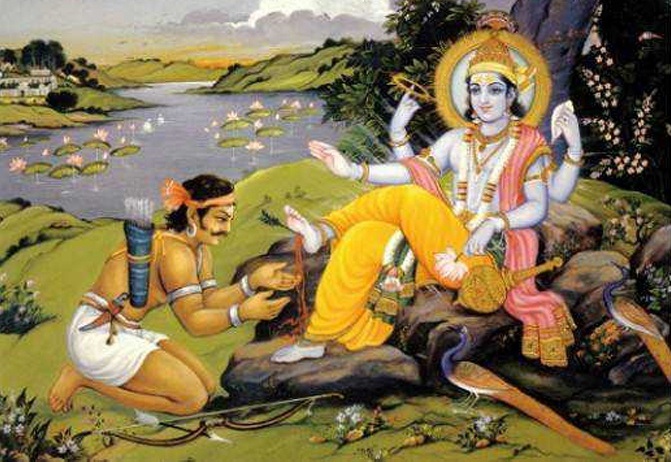
‘I have lost all faith in God. He never answers my prayers.’
‘Why do good people suffer so much? Is there no God?’
How is God responsible for the consequence of one’s own karma or actions, I wonder? No action or thought, is without a reaction. For us Hindus, God is not an authoritarian entity, separate from us. The Supreme is within us and the realisation of this Truth is what sets us free from the cycle of birth and death – to attain moksha. Our heaven and hell are not for eternity as in Abrahamic religions. Swarga and naraka are but transit points before the soul takes rebirth in some living form, depending upon its karmas.
Often, we are shocked to see some evil or cruel person (most politicians) seemingly thriving despite his or her actions, and want to see them suffer just as badly for their deeds. But who are we to decide on someone’s karma? If it is his past karma that is keeping him in his position now, his present misdeeds and evilness are sure to bear their fruit. We might not able to see it, but it is sure to happen. The law of karma does not always apply instantly or even in this life. It is an inexorable system of justice whose wheels grind surely, even if slowly at times, sometimes spanning several lifetimes. You can read my post on this aspect, here).
I am reminded of a story from Bhagavatam, which I have heard many times in different forms. It is about a wealthy man who is an arrogant person, who believed that his wealth was due to his own efforts in this life. He didn’t believe in daana-dharma and neglected the worship of the family deities too. One of his daughters-in-law, who came from a very dharmic family felt very sad and thought of a plan to reform him. So whenever anyone from her parental home or town came to visit and asked after her welfare, she replied, ‘We are well, eating leftovers.’ Members of her in-law’s family were shocked.
This went on for quite sometime till one day the mother-in-law confronted her. ‘How can you lie like this to your people? You know very well that we never have leftovers in this house and cook fresh food for every meal.’
The daughter-in-law remained quiet. The next day she served chana-gud (roasted gram and jaggery) to her father-in-law at breakfast. The furious man wanted to know how she dared serve him a poor man’s food when he was so wealthy.
The girl calmly replied, ‘I am only preparing you for your next birth when you might only get this to eat, if you are lucky. We are eating leftovers of the good karma of your past lives, so the leftovers are good. But if you don’t do your dharmic duties in this life, chana-gud might be the food in your next life.’
The story goes that the man was brought up short by her calm words and mended his ways.
The concept of daana-paani (grain-water) also is similar. We keep moving in life – up, down and from place to place. I have heard elders say that we move on when we have completed the karmic circle in a particular situation or place. Like the run of misfortunes for a period followed by prosperity or vice versa. Or, moving from place to place – having completed the karmic transactions – be it material or otherwise, with the people in one place.
Don’t we feel an unexplainable kinship with some people, as if it were some leftover relationship from a previous life? There are inexplicable meetings and partings, which can also be attributed to some pending karmic transactions having been completed, rather than by destiny.
It takes several lifetimes for one to work off one’s karma, which means there is no eternal heaven or hell, but multiple rebirths to work off the accumulated karma. According to elders, every life form goes through 84 lakh births spanning every form of life including plants. That is why it is said that one should not waste the human life in useless pursuits but should aim to break free of this cycle. And it is not just bad karma that one needs to work off. Even good karma has to be nullified till the slate is well balanced with no karma on either the credit or debit sides. That is when one attains moksha or oneness with the Supreme. There are no more births for such jeevas — which is the goal of every devout Hindu. Such a state is admittedly very difficult to attain because even thoughts create karma and we know that it is next to impossible to control them!
Unlike Abrahamic religions that have strict injunctions for humans on how to behave, our dharma gives us the freedom to choose our actions. What a democratic concept this is! We can decide what we want to be – a dharmic or adharmic person and, here is where the crux is: we should be prepared for the consequences of our actions.
Under no condition karmic consequences can be removed with some prayaschit or penance. Everyone has to work off their karma. It is not like going for confession and the priest gives a penance of a certain number of Hail Marys to be repeated for the sin to be condoned by God – and walk out of the confession booth with a clean slate, so to speak. Western sensibilities have coined the term Karma is a bitch, as if it is something extraneous like the Abrahamic God sitting in high heaven and deciding the fates of humans based on His whims. I have so often wondered and searched in vain for some explanation as to how a compassionate God can arbitrarily decide on the fates of human beings. How they can be so varied, if all humans are the sinful descendants of the ‘original sinners’ Adam and Eve? Shouldn’t then the scale of suffering/happiness be the same for everyone?
In this respect, the law of karma is the logical explanation for this unequal world of ours. Our puranas are replete with stories and anecdotes on how inexorable karma can be, catching up with us sooner or later. Even the Supreme deities Shiva and Vishnu are not above its inexorable justice. Bhikshatana’s Brahmahatti dosha (killing of a Brahman), for having plucked off the fifth head of Brahma, saw him wandering the earth with the skull stuck to his hand and begging for food. The skull emptied even as it was filled with bhiksha. It was Annapurani of Varanasi, who finally filled the skull with food and released him from the curse.
Likewise, in Krishnavatar, the arrow from the hidden bow of Jara pierced his ankle and led to his leaving his avatara body. Puranas have it that it was the karma incurred by Vishnu during Ramavatar, when he had shot at Vali hiding behind a tree and that Vali had returned as Jara to complete the karmic circle.
The western perception is flawed about karma. ‘Karma is a b****h’, is one such statement. It is as if karma is some entity and not the result of one’s own actions. The other is that belief in karma makes people passive as well as insensitive. On the contrary, the plight of an unfortunate person can act as a wakeup call to us to mend our ways and pay heed to our actions. Our culture is built on compassion and daana. Distinct from the western concept of charity that puts the giver on a higher place than the receiver, daana can be done by even the poorest of poor and is not measured in terms of material things. Again, we have innumerable stories and legends in our puranas illustrating this.
One question that many might ask is, ‘If karma can make or mar my life, why don’t I stop all actions so that I am free of rebirths?’ Not possible, my friend.
The most often quoted verse in the Bhagavad Gita tells us to give up the fruits of our actions. But there is another one where Krishna cautions us about giving up all action to avoid creating karma:
न कर्मणामनारम्भान्नैष्कर्म्यं पुरुषोऽश्नुते |
न च संन्यसनादेव सिद्धिं समधिगच्छति || 4||
One cannot achieve freedom from karmic reactions by merely abstaining from work, nor can one attain perfection of knowledge by mere physical renunciation. Chapter III, Verse 4
Under the circumstances, surrendering all thoughts and action to the Supreme is the most prudent thing, which can save us from mindlessly creating karma. If the surrender is complete, there is no way one would indulge in either adharmic thoughts or action and our karmas are bound to become pure. Guided by the Supreme, it would ultimately pave the way to moksha.
Krishnaarpanam astu!
For more on the topic, you can read my posts here and here.
Images: Top- https://www.quora.com/ Homepage:https://www.pngegg.com/en/png-inger







[…] easier to accept. Also meeting people or moving away from them depends on the settlement of our mutual karmic debts. This is one lesson which I have had to keep hammering into my head to prevent the […]
LikeLike
Nothing like the Wisdom of Sanatana Dharma !
Lead from the Darkness to Light ,
From Untruth to Truth,
And from Mortality to Immortality !!!
Shanti, Shanti, Shantihi !!!
Beautifully expressed! MIKKA NANDRI !
LikeLike
Thank you, Vijyaa for reading and commenting. Yes, Sanatana Dharma is the most profound one.
Nice to see have you here 🙂
LikeLike
You have explained the concept of karma very well. The idea that we have crafted our present and are the architects of our future is often forgotten when people complain about their lot. It is a bitter pill to swallow I guess.
You said, “There are no more births for such jeevas — which is the goal of every devout Hindu. Such a state is admittedly very difficult to attain because even thoughts create karma and we know that it is next to impossible to control them!”
While it is possible to practice karma yoga and avoid accumulating new karma, it is impossible to exhaust all past karmas and then get moksha! The only way is to attain atma jnana (self knowledge) which burns up all past karma. Scriptures prescribe karma yoga followed by jnana yoga for this.
LikeLiked by 1 person
So good to see you here after a long time, Palamadai Neelakantan! I have also heard it said that one has to progress from karma yoga to gnana yoga before one attains oneness with the Supreme. But bhakti yoga alone can give moksha. Pardon me if the views sound naive 🙂 That is why I usually put a disclaimer when I write on such topics, since I am no scholar or even well-versed in our dharma shastras.
LikeLike
There are multiple schools of philosophy in our tradition each with varying interpretations. From the advaita standpoint, jnana alone can give moksha since the fundamental problem is avidya (ignorance of one’s true nature). The recommended sadhana is karma yoga followed by jnana yoga but bhakti is an integral and indispensable part of both.
Let me add that I am a student of the scriptures and have a lot to learn still 🙂
LikeLiked by 1 person
A student can never complete learning. But blessed are those who have at least begun! The progress towards gnana marga is extremely slow in my case. I am trying to navigate the bhakti marga still 🙂
LikeLike
Lovely post. Important to one self.
First sentence, after we open the Rigveda, right almost on the first page after the cover is written ‘aham brahma asmi’
It is us, that we have to attain. We are the quest. All karma should lead to this oneself. And thus swarg or nark are some shops, temporary, both. On the road to nara. The way of the water. Narayan.
I read, long time ago that you live in Dubai?
My wishes
Narayan
LikeLiked by 1 person
Namaste Narayana! Thank you for your wise words on the topic of which you certainly have a lot more material to contribute than I could ever have! Attaining oneself is what attaining the Supreme is, since both are inseparable, right?
Will be connecting with you soon. And no, I have never been to Dubai. wherever did you get that feeling from?
LikeLike
Reading you after a long time ma. The profound wisdom of Hinduism is something others can only aspire to. All-encompassing, forgiving yet stoic. I cannot say I know much about spirituality but I can say that being a Hindu, it is an intrinsic part of our dharma. The article flowed so smoothly, calming the mind and laying to rest the ripples, which are after all transient like everything in our lives.
LikeLiked by 2 people
Very nicely penned the two different ways of looking at our karmas. I am sure that everyone will agree that Hinduism is the mother of all religions.
What I am interested to know if moksha can be obtained by taking samadhi?
LikeLike
So nice to see you here, Kalakutti. I am writing very seldom these days. We hardly realise what a goldmine we have in our heritage and civilsational wisdom and so are blithely either ignoring or throwing it all away.
I am old but do not have enough knowledge to write on any spiritual topic with authority. What I write here is the result of my own experiences and words of elders around me. Thank you for finding it soothing 🙂
LikeLike